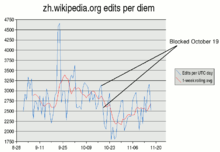Censorship of Wikimedia projects
This page is outdated, but if it was updated, it might still be useful. Please help by correcting, augmenting and revising the text into an up-to-date form. Note: I'm pledging to try my best knowledge to list all cases here, please feel free to help me, thank you very much. --Liuxinyu970226 (talk) 04:57, 25 April 2019 (UTC) |
This page aims to list all ongoing and past Internet censorships that are affect(ing/ed/ive?) to any Wikimedia Foundation wiki projects.
China
[edit]An ongoing story may be found in English (en:Blocking_of_Wikipedia_in_mainland_China) and Chinese (zh:中国大陆封锁维基媒体事件).
See also: October 2005 Chinese Wikipedia block effects on edit count


Opinion at the WSIS
[edit]The argument that Jimbo put forward in his talk in Tunis at the World Summit on the Information Society can be summarized as follows:
1. Wikipedia is neither critical nor supportive of the Chinese government. We are not a website for dissidents nor for government supporters. We are neutral. NPOV is non-negotiable. It is impossible to portray Wikipedia as anti-Chinese government unless the Chinese government wants to argue that neutral information is anti-Chinese government, and I don't think that's what they intend to say at all.
2. It isn't *just* that Chinese people cannot read any of Wikipedia, most of which is not about political or sensitive topics at all. It is that Chinese people are unable to *express* their views and culture in the Chinese Wikipedia or English Wikipedia or anywhere else, so long as Wikipedia is blocked. Since, I am told, the Chinese wikipedians tend to have more of a "mainland" view of things, as compared to Chinese living in Taiwan or Hong Kong, the ironic effect of the Chinese censorship is to censor the mainland perspective on world affairs.
It is fine to criticize the Chinese government for censorship of criticism. But my argument was not about that at all, since we are not critics of the Chinese government. My argument was that censoring Wikipedia in China is ironically censoring *the rest of the world* from hearing the voice of the Chinese people.
2020s note
[edit]As indicated by activities of Wikimedians of Mainland China, as well as activities of users from Li Yi Bar of China, and the discovery of state-sponsored Internet propaganda from China among other countries, it have shown that Chinese government, as well as some citizens supporting the country's current regime, and also a few who have high information technology literacy, are able to bypass government restriction on internet browsing, enabling them to view and edit content of Wikipedia, despite the capacity to do so is not equal among citizens of the country. Thus, the NPOV principle of Wikimedian projects could face challenge with some of these contributors who attend the platform with specific objectives.
European Union countries
[edit]See also: European Commission copyright consultation
Middle east, Central and South Asia and Africa
[edit]Russia
[edit]Turkey
[edit]An ongoing story may be found in English (en:2017 block of Wikipedia in Turkey).
See also: Response to 2017 ban in Turkey, WMF update August 2017.
Users wen't down about 80 %, see monthly unique devices.
United States
[edit]While not a unilateral act of censorship, and not a successful one either, on July 2010 the Wikimedia Foundation was instructed by the U.S. Department of Justice[1] to take down file:seal of the Federal Bureau of Investigation.svg. The Wikimedia Foundation argued to the contrary.[2]
Venezuela
[edit]It has been confirmed that the biggest ISP provider in Venezuela, CANTV, has blocked all Wikipedias, all Spanish and Calatan other Wikimedia Projects, and blocking the usage of Spanish interface in other projects, to countermeasure sanctions from United States governments, and to protest supporters of "Guaidó temporary government" which is living in Colombia and Brazil border area with Venezuela. Also per some statements from IP users, even in cases that they may use other Wikimedia projects with English interface, under a special setting from CANTV, their IP address (and even ranges) are most likely neither from Venezuela nor from United States. [3][4][5]
References
[edit]- ↑ http://graphics8.nytimes.com/packages/pdf/us/20100803-wiki-LetterFromLarson.pdf
- ↑ http://graphics8.nytimes.com/packages/pdf/us/20100803-wiki-LetterToLarson.pdf
- ↑ "Venezuela’s crisis of political legitimacy has rocked Wikipedia — and might have led to its blocking · Global Voices". Global Voices. 2019-01-15. Retrieved 2019-01-21.
- ↑ "Wikipedia blocked in Venezuela as internet controls tighten". NetBlocks (in en-US). 2019-01-12. Retrieved 2019-01-13.
- ↑ "Venezuela Blocks Wikipedia After Maduro ‘Ousted’ From Article, Internet Watchdog Says". Haaretz. 2019-01-13. Retrieved 2019-01-13.
